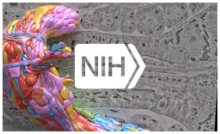
Recently, the NIH BRAIN Initiative Multi-Council Working Group met to discuss future funding opportunities and the sixth annual BRAIN Initiative® Investigators meeting convened BRAIN-funded researchers, stakeholders, and the public to share and discuss the latest discoveries.
Due to the ongoing coronavirus public health crisis, these recent meetings were held virtually. On May 22nd, 2020, the BRAIN Initiative’s Multi-Council Working Group (MCWG) convened its sixteenth meeting to discuss the impacts of COVID-19 on research, updates on BRAIN 2.0, and future BRAIN funding. The MCWG oversees the long-term scientific vision of the BRAIN Initiative.
Dr. Walter Koroshetz, Director of NINDS, highlighted several recent BRAIN-funded studies that linked brain activity to internal states and behavior. These findings were made possible by technological advances in imaging tools and computational modeling. Dr. Koroshetz also discussed COVID-19 funding opportunities for BRAIN-funded researchers and overviewed NIH-wide efforts to develop vaccines, therapeutics, and tests for the virus.
Dr. John Ngai, Director of the NIH BRAIN Initiative, provided an update on BRAIN 2.0 and discussed transformative projects, including suggested plans to create a cell-type armamentarium and human brain cell atlas. NIH staff presented two concepts for future funding opportunities: organizing resources for cell-type access and modulation across species, and novel technologies for brain microconnectivity analysis. The first concept builds upon the remarkable progress made thus far under the BRAIN Initiative Cell Census Network (BICCN).
For more details, please read the MCWG meeting summary(pdf, 116 KB) and view the archived videocast.
***

The BRAIN Initiative® Investigators meeting is an exciting opportunity each year to learn about the latest scientific findings, meet potential new collaborators, and engage with the BRAIN community. To continue these efforts during the pandemic, we organized a virtual event that took place from June 1-2, 2020. Our sixth annual meeting, and first ever virtual meeting, was a huge success, convening over 4800 registrants (a 282% increase from last year) from around the world!
This year’s meeting featured plenary presentations by Drs. Rachel Wilson, Eve Marder, Edward Chang, and Xiaowei Zhuang. On June 1st, Dr. Joshua Gordon, Director of the National Institute of Mental Health, welcomed everyone to the event and Dr. Wilson from Harvard University presented her latest findings on the neural circuit, cellular, and synaptic mechanisms of navigation behavior in Drosophila – to an audience of nearly 1200 attendees! On the first day, there was also a special neuroethics-focused session, where participants from a broad range of disciplines and career stages discussed ethical considerations in the time of COVID-19 with neuroethicists.
Across both days, BRAIN-funded researchers led eight scientific symposia on key topics in BRAIN research, including systems neuroscience and machine learning, the expansion of species diversity in neuroscience, molecular taxonomies of brain cells, novel microscopy methods for imaging brain activity, and neurotechnologies for human research. This year, rather than travel to present their work, trainee travel awardees highlighted their latest research via virtual flash talks and participated in live Q&A sessions led by Dr. Ngai and other experts.
On June 1st, Liz Neely, Executive Director of The Story Collider, led a workshop on narrative methods in science communication and how to correct misinformation. The next day, Rohan Verma, Vice President at Ogilvy Public Relations Worldwide, moderated a workshop on how to use social media to promote BRAIN science, where speakers Drs. Russell Poldrack (@russpoldrack) and Daniela Witten (@daniela_witten) provided attendees with insight and tips on how to use Twitter as a scientist.
The virtual environment featured booths where attendees could chat live with staff from the Allen Institute for Brain Science, Society for Neuroscience, International Brain Initiative, and other BRAIN partners one-on-one. There were also several poster halls (with over 400 posters on display) and virtual networking opportunities throughout the event.
We also showcased the finalists from this year’s Show Us Your BRAINS! Photo and Video Contest and attendees voted for their favorites online. Congratulations to Dr. Linus Manubens-Gil for winning the photo contest and to Dr. Sunil Gandhi, Ricardo Azevedo, and Dr. Damian Wheeler for winning the video contest!

If you missed out on a presentation or workshop (or the meeting altogether) all presentations, workshops, posters, resources, and more are available to watch on-demand until May 2021. For more details, please read the BRAIN Investigators meeting summary.
We hope to see everyone at the seventh annual BRAIN Initiative® Investigators meeting in 2021!
